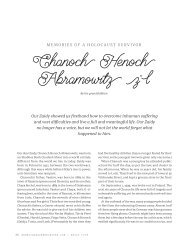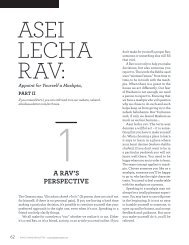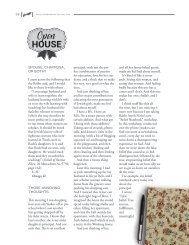You also want an ePaper? Increase the reach of your titles
YUMPU automatically turns print PDFs into web optimized ePapers that Google loves.
Welcome!<br />
N’SHEI CHABAD NEWSLETTER READER SURVEY ON<br />
HACHNASAS ORCHIM<br />
34 NSHEICHABADNEWSLETTER.COM | SEPTEMBER 2017
O<br />
Once again, dear readers, you came<br />
through for us! Our first reader survey<br />
in 2012, on the topic of mashpia,<br />
generated a wealth of insights. We<br />
still receive reprint requests for our<br />
mashpia series. Your honest responses<br />
helped many to confront their fears<br />
about having a mashpia and clarify<br />
the importance of this directive of<br />
the Rebbe.<br />
And so we decided to conduct<br />
a reader survey on the topic of<br />
hachnasas orchim, a mitzvah and<br />
a way of life for which Chabad is<br />
famous around the world. Everyone<br />
knows that if you’re a stranded<br />
traveler or are hospitalized in a<br />
distant city chas v’shalom, you can<br />
call upon your local Chabad family<br />
and you will be welcomed like a longlost<br />
sister. During Tishrei, families in<br />
Crown Heights open their homes for<br />
weeks on end to accommodate the<br />
streams of visitors who come from<br />
around the world.<br />
For many of us, the mechanics of hosting week after week can be<br />
overwhelming. We asked our readers to explore some of the blessings<br />
and challenges of running an open home. We thank all the 120+ readers<br />
who participated in our survey.<br />
We learned that hosts and guests worried about many of the same<br />
things. Many hosts said the hardest part of hosting was feeling “on<br />
display” all the time. Guests for their part are afraid of being in the way,<br />
of being a burden. Hosts worry about how the food will turn out, if there<br />
will be enough and if everyone will like it. Guests worry about what<br />
to say if they’re really not hungry or can’t eat what the host prepared.<br />
Hosts worry if the house is clean enough for guests; guests worry if<br />
they are creating too much of a mess. And both hosts and guests worry<br />
about their children’s behavior and how it will be perceived by others.<br />
(Are we seeing a pattern here?)<br />
Bottom line, we all have our fears and insecurities and worry<br />
about being judged by others. We all feel a bit shy and awkward<br />
making conversation with strangers, regardless of which side of the<br />
hosting table we’re on. We all worry about inadvertently overstepping<br />
boundaries and making others feel uncomfortable.<br />
Some responses were nearly unanimous: For example, all our<br />
respondents agree that it is sometimes okay to refuse guests, although<br />
people drew the line in different places. Some will refuse guests only in<br />
case of emergency, while others schedule regular guest-free Shabbosos.<br />
Everyone agrees that guests should offer to help, but some hosts really<br />
do mean it when they say you don’t have to (offer anyway!). With many<br />
of the questions, though, we enjoyed a diversity of responses. For<br />
example, some hosts want no tangible gifts while others appreciate<br />
a small token; some prefer fresh flowers while others like edible gifts.<br />
The best suggestion might be to ask the host in advance what you can<br />
bring, though some hosts will have a hard time answering honestly.<br />
Also, while guests certainly appreciate deluxe accommodations, even<br />
simple homes can provide a stellar experience for guests. And we<br />
learned something about Israeli washing machines that would never<br />
have occurred to us before! –Chaya Shuchat<br />
SEPTEMBER 2017 | NSHEICHABADNEWSLETTER.COM 35
The Host’s Perspective<br />
#1 What is most rewarding about being a host?<br />
• I was an out-of-towner and a guest for many<br />
years in others’ homes. My husband and I both<br />
decided that after we got married we wanted<br />
a home where our guests would feel welcome<br />
and comfortable.<br />
• I love seeing my children learn how to give of<br />
themselves with joy.<br />
• I love the fact that I can fulfill a mitzvah even<br />
while I’m asleep.<br />
• When our guests bless each other that they<br />
should have an open home and Shabbos table<br />
like ours one day.<br />
• Having people tell me how comfortable and at<br />
home they feel in my home.<br />
• There were times when I felt very insecure<br />
about my home or my parenting skills, and<br />
then a guest would compliment me on what<br />
a warm, chassidishe home we had. Seeing our<br />
home through our guests’ eyes gave me a lot of<br />
chizuk and helped me through some difficult<br />
moments.<br />
• It makes day-to-day life feel more purposeful<br />
and valuable, knowing the space in our house<br />
is not going to waste.<br />
• The most rewarding part is that I know I<br />
am doing the Rebbe’s shlichus (though I live<br />
in Crown Heights) and, in turn, I know my<br />
kids listen in on the long Shabbos afternoon<br />
discussions about covering hair, keeping the<br />
laws of tznius, etc., and gain tremendously<br />
from that.<br />
• #2 What is the most challenging part about<br />
hosting?<br />
• Seeing other kids be destructive or mean and<br />
not feeling like I have a right to tell them what<br />
to do. It’s extremely frustrating when the parent<br />
is not taking care of the child.<br />
• Some guests are needy and want to talk more<br />
than I want to.<br />
• Managing guests and our children at the same<br />
time.<br />
• It’s annoying when guests don’t offer to help<br />
clear up, set up or help in some way. I always<br />
accept help and don’t like feeling like I’m just<br />
slaving away.<br />
• Having food available for guests to snack on<br />
between the formal meals.<br />
• When your guest gives your lock combination<br />
to his friend and tells his friend he can sleep<br />
in the bed designated for the guest when the<br />
guest isn’t using it.<br />
• Dealing pleasantly with people with serious<br />
emotional issues.<br />
• My children’s behavior during the meal—trying<br />
to keep them eating healthy, being respectful,<br />
and not fighting with each other,<br />
• When we lived in Crown Heights we always had<br />
a lot of guests until our family grew and we had<br />
no space. We had to move out of town to afford<br />
a house. Now we have the space b”H but not so<br />
many people coming and going that need a place<br />
to stay…<br />
• Israel isn’t America and most people here<br />
[in Israel] don’t have hired help. Preparing a<br />
variety of plentiful food alone, without help,<br />
is a challenge. The girls (and boys) who come<br />
for Shabbos have to sleep here so I always try<br />
to make a special effort to have a clean and<br />
inviting house for my guests.<br />
• Keeping my kids under control and out of the<br />
guest’s belongings.<br />
36 NSHEICHABADNEWSLETTER.COM | TISHREI 2017
#3 When do you feel it’s right to refuse guests?<br />
• Family comes first. If for any reason the<br />
guests will interfere with shalom bayis, guests<br />
should not be invited.<br />
• If I don’t feel it will be comfortable for guests—<br />
such as no space, or no time or energy to<br />
prepare properly for them. The exception is<br />
when they really need a place and can’t find<br />
anywhere else to stay. In that case we make<br />
room but also make clear what we are able to<br />
offer—if they sleep on the couch they need to<br />
be out by 8 a.m.<br />
• My husband is not always home at night so I<br />
can’t have male guests when he is not home.<br />
We also refuse if the guest really has no plan<br />
to leave or has nowhere to go afterward.<br />
• When we would resent them being in the<br />
house and would not fully be able to show<br />
them the hachnasas orchim they deserve.<br />
• When it’s been non-stop shifts of guests.<br />
• If your gut says something is off or the guest<br />
is extremely rude.<br />
• When the person is known to be a danger to<br />
children. My kids come first here.<br />
• It is very important to have time as a couple<br />
without guests when first married. The<br />
frequency and duration of the alone time<br />
depends on the needs of the couple.<br />
• If I have a guest who does not respect<br />
boundaries, by getting on my computer and<br />
going through private items, I will not allow<br />
her to come again.<br />
• Some years, when the kids were all home and<br />
around our table, we had a rule that one of the<br />
seder nights was only for v’shinantam levanecha.<br />
A boy who knows how to clean up<br />
fast before the guests arrive.<br />
It gave the kids a chance to share their divrei<br />
Torah to the hilt and get maximum attention<br />
from parents. The other seder night was for<br />
guests.<br />
• It is fine to refuse guests when the guest is too<br />
demanding on your kochos. One guest kept me<br />
up talking until 2 a.m. and then resumed her<br />
conversation at 7 a.m. when I got up to nurse<br />
the baby. My husband wisely noted that this<br />
was too much for me, so after that Shabbos, I<br />
didn’t invite her back for six months. He said<br />
if I had been firmer about my own needs, she<br />
could have been a more regular guest. She was<br />
the loser because I had ignored my needs. After<br />
that, I took his advice for future guests, learning<br />
to say, “I’m sorry, I can’t talk now.”<br />
• Out here on shlichus we’ve only refused<br />
TISHREI 2017 | NSHEICHABADNEWSLETTER.COM 37
overnight guests when we were still living in a<br />
two-bedroom apartment with three kids and it<br />
would have been uncomfortable for the guest<br />
to sleep on the couch.<br />
• My husband isn’t comfortable with large crowds<br />
or with more than one family at a time, so I<br />
have to respect that.<br />
than to be influenced.<br />
• We try to arrange it so the guests don’t have the<br />
opportunity to make anything treif.<br />
• When a guest says or does something<br />
inappropriate, we speak to the children<br />
afterwards and use it as a teachable moment.<br />
• We stopped hosting sleepover guests after our<br />
fifth was born, when we just could not squeeze<br />
extra people into our tiny apartment. Maybe<br />
other people would have still hosted under<br />
those circumstances, but I couldn’t, so I didn’t.<br />
• It’s always okay to<br />
refuse guests. There<br />
is no “must” to this.<br />
If you are not up to<br />
it, or in the mood,<br />
how can you make<br />
guests comfortable?<br />
It’s your house, so<br />
it’s up to you.<br />
#4 How do guests affect<br />
the chassidishkeit of<br />
your home, and/or your<br />
children’s chinuch?<br />
Preparing the room for a guest.<br />
• I invite all sorts of<br />
people of varying<br />
levels of frumkeit. My family knows we accept<br />
everyone even though we may not live the same<br />
lifestyle.<br />
• Hosting helps our children learn how to<br />
properly host when they get older.<br />
• It’s good for children to know that there are<br />
all kinds of Jews and every one of them has a<br />
neshamah and something to share. At the same<br />
time, we parents must be vigilant and not naïve.<br />
We open our homes to total strangers without<br />
any kind of background<br />
check, but we cannot be<br />
“good” at the expense of<br />
our children. Be careful.<br />
• I think my kids<br />
have learned how to<br />
explain certain mitzvos,<br />
which helps them clarify<br />
for themselves as well.<br />
They have also learned<br />
that we are not afraid of<br />
the world. It has made<br />
them stronger.<br />
• Guests are a huge<br />
brachah. They are a chance<br />
to model for the kids how<br />
we care for others, teach<br />
them about Yiddishkeit,<br />
welcome them in, and have ahavas Yisroel no<br />
matter how needy the person is.<br />
• The children behave with much more maturity<br />
when there are guests and they know they have<br />
to make a kiddush Hashem.<br />
• The children learn to deal with different types<br />
of children, to see how my husband redirects<br />
conversations to Torah topics, and they learn<br />
to share their divrei Torah publicly.<br />
• My children are part of our shlichus and the<br />
hosting role teaches them to influence rather<br />
• In our home, even with guests, our boys keep<br />
their seats next to their father and do not get<br />
displaced, and make their own kiddush while<br />
everyone else listens. We also maintain our usual<br />
custom of each child sharing a dvar Torah or<br />
something from the week’s experiences in the<br />
first course, before they are allowed to leave the<br />
38 NSHEICHABADNEWSLETTER.COM | TISHREI 2017
table (each depending on their age and ability to<br />
sit for a length of time). So, no matter what, the<br />
focus is completely on them and on the Shabbos<br />
theme at least for the first course. I also have a<br />
children’s book of divrei Torah that can be used<br />
by any child who did not have anything prepared.<br />
• Our biggest challenge is hosting not-yet-frum<br />
grandparents. We’re obligated to welcome them<br />
and show them respect, but it’s very problematic<br />
to constantly change the subject when they<br />
enjoy discussing a recent movie. I asked a Rav for<br />
guidance and have implemented his guidelines.<br />
• The Shabbos meal in today’s busy, frenetic<br />
lifestyle is the most important teaching<br />
moment for our children that cannot be<br />
sacrificed, no matter how many guests we<br />
have. While they fully benefit by sharing in the<br />
hosting of guests, they need to be noticed and<br />
empowered at the Shabbos table.<br />
• We usually try to put our best foot forward when<br />
we have guests, so guests tend to positively affect<br />
the chassidishkeit of our home and are generally<br />
good for our children’s chinuch.<br />
• We are shluchim on a college campus and the<br />
conversations between students around the<br />
table can be off-color, but we try to keep it<br />
clean and chassidish. I tell my kids they have<br />
to be dugma chaya and they’re happy to show<br />
their school craft, say divrei Torah and sing. My<br />
husband and I are really comfortable stopping<br />
an inappropriate conversation at the table or<br />
making a remark when they use vulgar words.<br />
We have to teach the students just as we teach<br />
our kids. This is part of the reason we are there.<br />
• We are all on our best or at least better behavior<br />
around guests so the more we have guests, the<br />
more it becomes a habit.<br />
• We find that by trying to inspire others we<br />
ourselves become inspired. We watch our<br />
kids giving over what they know to others<br />
less knowledgeable than themselves, and the<br />
“shluchim instincts” come out, and they are very<br />
This baby is busy making guests feel<br />
comfortable.<br />
proud! But at the same time we try to protect<br />
them by explaining to them how we differ from<br />
other people and remove them from situations<br />
or conversations that are potentially harmful.<br />
• We live in Crown Heights. When shluchim<br />
come, our children are very proud of hosting<br />
the Rebbe’s shluchim. When it’s Tishrei it’s the<br />
Rebbe’s guests. People come to the Rebbe! By<br />
hosting them I feel I strengthen their connection<br />
to the Rebbe and Yiddishkeit. I still pull up<br />
memories of the myriads of people that my<br />
parents hosted over the years as an inspiration<br />
to push myself to have guests in my home.<br />
#5 As a frum, busy Jew, what motivates you to keep<br />
hosting guests?<br />
• When we got a bigger apartment we made a<br />
promise that it would be used for hosting.<br />
• In our wedding video my shver blessed us to have<br />
“ah Yiddishe shtub, ah chassidishe shtub, ah shtub<br />
fun hachnasas orchim....”<br />
• I was raised in a large family. We had two and a<br />
half bedrooms and there was always room for<br />
guests. It’s in my blood. I truly enjoy it.<br />
TISHREI 2017 | NSHEICHABADNEWSLETTER.COM 39
• I love the new conversation, I love my<br />
tablescape, I love my food (and seeing others<br />
enjoy it too!). I love having people around.<br />
• I was not brought up frum. Before I got married,<br />
many people were extremely generous to me,<br />
hosting me for seudos and even overnight. I am<br />
very grateful and inspired by their example and<br />
I want to pay it forward.<br />
• Hosting very much motivates me to get my<br />
house in shape, to focus on what’s important<br />
and not be self-absorbed.<br />
• We took this mitzvah<br />
upon ourselves<br />
because we didn’t<br />
have children for<br />
many years. One<br />
time a very special<br />
rabbi came to stay<br />
with us who gave us a<br />
brachah to have kids<br />
and baruch Hashem<br />
we had children after<br />
that. I still keep that<br />
mitzvah.<br />
• I strongly feel that if<br />
I was blessed with a<br />
beautiful home in the<br />
Rebbe’s neighborhood<br />
it is my honor to open<br />
my doors for those<br />
who need a bed,<br />
temporarily.<br />
This baby has been welcoming<br />
guests since birth.<br />
• Our parents always had a lot of guests, and<br />
we feel that it’s the shlichus of people living in<br />
Crown Heights.<br />
• This is a relatively easy mitzvah for me. We<br />
have a large, comfortable and now empty<br />
apartment. Why should I not open my home<br />
to people in need?<br />
think I ever slept in my bed on a Shabbos.<br />
My permanent space was under the dining<br />
room table with a blanket and pillow and I<br />
was very happy listening to the sounds of my<br />
father’s weekly Thursday night shiur with his<br />
friends and the sound of the air conditioner<br />
humming. Having guests and giving up beds<br />
for them is, to me, synonymous with a kid<br />
experiencing a secure and happy childhood.<br />
As an older child living in a bigger house, I’d go<br />
to 770 on Sukkos and bring home Israeli and<br />
French girls who didn’t have places to go for<br />
Yom Tov meals. They became part of the fun<br />
of Yom Tov, the insane<br />
mixed accents. It was<br />
a blast!<br />
and appropriate.<br />
#6 If you could give<br />
your guest one piece<br />
of advice that would<br />
improve your and<br />
their experience, what<br />
would it be?<br />
• Don’t be<br />
embarrassed to take<br />
seconds.<br />
• Please ask where<br />
to sit. Don’t just plop<br />
down anywhere. I<br />
have thought hard<br />
about whom to seat<br />
where to keep things<br />
tzniusdik, welcoming,<br />
• I don’t expect a gift, as our apartment is small<br />
and we don’t have room to put extra stuff. But<br />
a note or word of appreciation is always nice.<br />
Even better is when you remember us years<br />
later.<br />
• When I was very young [growing up in Crown<br />
Heights], we lived in a small apartment. I don’t<br />
• Bring a gift. Even a $5 tchotchke can mean a lot<br />
to a family who is sharing their living space.<br />
40 NSHEICHABADNEWSLETTER.COM | TISHREI 2017
I had guests who bought us day passes for<br />
our family to the JCM, which was beyond our<br />
expectations and very much appreciated.<br />
• Leave when you said you were going to leave.<br />
DON’T ask for one more week, please don’t.<br />
• If you bring children, make sure to wake up in<br />
the morning when the children wake up. Don’t<br />
put the host into the situation of doing negel<br />
vasser, serving breakfast to your children, and<br />
managing squabbles.<br />
• Don’t disturb the daily routines of the house.<br />
When it’s dinner time let the kids eat, when<br />
it’s bath time don’t hype up the kids. When the<br />
house goes quiet, respect the silence.<br />
• Don’t follow me all over the house when I need<br />
to go get a diaper or something. Don’t open my<br />
drawers. Be helpful on my terms, not what you<br />
think is helpful. Ask me. I’ll tell you.<br />
• If your host does not need help setting up, ask<br />
again at cleanup.<br />
• Let me know in advance if there are any food<br />
allergies or special requests such as gluten-free,<br />
nut-free, etc.<br />
• Please don’t wait for me to ask when you<br />
are arriving and leaving for your trip. It’s<br />
uncomfortable for us to ask and we need to have<br />
the room ready and need to know when we can<br />
expect the room to be available again.<br />
• It’s not your job to help raise the children,<br />
change the level of frumkeit or cause strife. Just<br />
enjoy yourself and be merry.<br />
• Know when to leave. If it’s midnight and the<br />
hosts are having quiet time in the kitchen while<br />
they pack up the fridge, you should not be there.<br />
You should be gone by now.<br />
• When I offer you a drink or some soup or<br />
breakfast, don’t refuse in order to be polite. I<br />
wouldn’t offer if I didn’t want to give and I am<br />
happy to serve you.<br />
• Throw away your garbage. I don’t care about<br />
stripping the sheets, but it’s not mentchlich<br />
when people eat take-out and leave the garbage<br />
around, or purchase clothing or shoes and leave<br />
all the boxes and wrapping around.<br />
• Please make it clear to me whether you want<br />
me to chat with you or leave you alone and give<br />
you privacy. It’s hard to read new people, and I<br />
want to be as hands-on or -off as you would like<br />
in my hosting.<br />
• Try not to accept an invitation if you don’t<br />
intend to come. And if your plans change, let<br />
the host know. It is inappropriate to bring other<br />
people with you unless you ask first.<br />
• I would encourage my guests to direct their<br />
comments and questions to all the family<br />
members at the table rather than holding<br />
private conversations.<br />
• In Israel, offer to bring your own linen. Israeli<br />
washing machines and dryers are small, slow<br />
and very expensive to run. Washing the linens<br />
after having hosted four or five girls literally<br />
takes the entire day. Guests from America<br />
often don’t realize what doing the laundry<br />
entails.<br />
• We are all human and sometimes we say or do<br />
things that are not perfect. Please do not judge<br />
your host’s shalom bayis, the way she raises her<br />
kids, etc. It’s best to simply “not notice” what<br />
goes on in the house among family members.<br />
• Please say the food is delicious, even if you don’t<br />
like it!<br />
• Don’t talk politics at the Shabbos table.<br />
• Be generous in your offer to help, especially<br />
if your host is cooking for you. That way you<br />
can avoid the buildup of resentment your host<br />
might have over the amount of work he or she<br />
is doing for you.<br />
TISHREI 2017 | NSHEICHABADNEWSLETTER.COM 41
• Don’t complain to me about other hosts. Don’t<br />
make fun of other people’s housekeeping<br />
standards, child-rearing, etc. in front of me.<br />
That makes me fear what you will say about<br />
us to others.<br />
• Don’t help me discipline my kids. It makes me<br />
discipline them all wrong and I usually regret<br />
whatever I say to them in front of you because<br />
you’re watching and commenting. Stay out of<br />
it. If I’m pretending to have not heard a slightly<br />
iffy comment from my 11-year-old, please don’t<br />
point it out to me. I wind up trying to please<br />
you instead of doing the right thing.<br />
• Eat what you are given. If you have been given<br />
a much smaller portion than you are used to<br />
or it’s fleishig and you would rather be milchig,<br />
don’t make it difficult for your host.<br />
• I haven’t space or need for more stuff. If you<br />
would like to bring a token of appreciation,<br />
bring perishables only (food, flowers). If you<br />
think you see something the host could use<br />
(more towels, for example), buy it, but be sure<br />
to include a gift receipt for easy exchanging.<br />
• The hardest part of hosting, for me, is putting<br />
my life on hold while I’m taking care of guests.<br />
Then when the guests leave, there’s a pile-up<br />
waiting for me that can be overwhelming. I’m<br />
not on vacation even if my guests are!<br />
The Guest’s Perspective<br />
#1. What was your most positive experience as a<br />
guest?<br />
• When I was becoming shomer Shabbos, the<br />
shlucha where I used to stay never ever told<br />
me that I shouldn’t be putting on make-up<br />
on Shabbos morning... she waited until I was<br />
ready to talk about it, and then I stopped doing<br />
it. That was in 1978, and I still feel so grateful.<br />
I even called her about it a few weeks ago just<br />
to say thanks!<br />
• I was pregnant with my first child and had<br />
nausea from morning to night. I had to travel<br />
to be at the bedside of a sick relative and was<br />
stranded Erev Shabbos in a strange city due<br />
to weather. I looked up Orthodox synagogues<br />
in the phone book and the rabbi sent a cab for<br />
me and treated me like family.<br />
• My son is allergic to chicken and we were<br />
invited to my sister for Pesach this year. She<br />
was so nervous about what he would eat since<br />
she planned to serve chicken for Yom Tov<br />
meals. In the end, she made a special batch of<br />
meatballs just for my son, and divided it up so<br />
he had his own portion for each meal. He was<br />
sitting at each meal beaming.<br />
• Once I was a guest at a seder and the family<br />
kept lots of chumras that I was not aware of.<br />
In my effort to help clear the table, I stacked<br />
the dishes to bring them to the kitchen. When<br />
I got there, the hostess looked horrified for a<br />
split second, but then calmly told me she would<br />
take them and they would be fine to finish<br />
the clearing, giving me the impression that<br />
I should go sit down. After she put the dishes<br />
safely aside, she came to explain that due to<br />
the risk of matzah crumbs which might have<br />
gotten on the table, they never stack dishes.<br />
She had put those dishes aside for next year,<br />
but she wanted me to know that it was not a<br />
problem at all. I felt bad and tried to apologize.<br />
She stopped me and sincerely said words which<br />
I have tried to emulate ever since: “It is more<br />
important that we fulfill the mitzvah de’oraysa<br />
of hachnasas orchim and focus on the feelings<br />
of our guests properly than to keep our chumras<br />
properly! We really don’t mind!”<br />
• I had to be in New York and my shluchim gave<br />
me the number of the Kugels in Manhattan,<br />
who graciously hosted me. I found out later<br />
that the Kugels didn’t even know my shliach!<br />
I would never have called asking them to host<br />
42 NSHEICHABADNEWSLETTER.COM | TISHREI 2017
me if I’d understood that my shliach didn’t<br />
really know them, out of shyness and out of<br />
the worldly sensibility that one doesn’t impose<br />
on a stranger (i.e., invite oneself over to be their<br />
guest!) other than in an emergency.<br />
• I remember being at someone’s house in<br />
seminary. I can’t say that I especially connected<br />
with the host as a person, but I do recall her<br />
sending my friend and me off after Shabbos<br />
with chumus and cucumber sandwiches. It was<br />
such a thoughtful and nurturing gesture. I still<br />
remember this almost 20 years later.<br />
• We arrived in<br />
her home in LA<br />
straight from the<br />
airport, 17 people<br />
for a chasunah, and<br />
she sat us down to<br />
a table full of food<br />
on Friday morning.<br />
I live in Crown<br />
Heights and I find<br />
it is very difficult for<br />
me to provide food<br />
for guests except on<br />
Shabbos.<br />
• An Israeli woman<br />
who spent a<br />
Shabbos with<br />
us reciprocated<br />
by inviting my<br />
husband and me to her home. She wanted<br />
her anti-religious husband to meet a nice<br />
frum couple. At that point he would cross the<br />
street when he saw a frum person walking in<br />
Manhattan. Now he is a good friend.<br />
We learn to cook in large quantities.<br />
• My sister-in-law! Our house was being painted<br />
and ended up needing unexpected repairs, and<br />
she took us into her (small) house for a week.<br />
• The Bernaths of Chicago who supplied an amazing<br />
hospitality breakfast and lunch for many guests<br />
for a chasunah. They offered all sorts of food and<br />
teas and I was amazed when Mr. Bernath suddenly<br />
appeared with a fork which he had noticed I was<br />
missing.<br />
• My sister-in-law for all the love she puts into<br />
each meal, from planning each person’s favorite<br />
dish to setting the table with care. Her joy in<br />
seeing her loved<br />
ones so happy and<br />
cared for creates<br />
indescribable<br />
warmth.<br />
• Our Rabbi<br />
once asked us to<br />
host a man who<br />
needed to attend<br />
a meeting on<br />
Shabbos within<br />
walking distance<br />
from our home.<br />
It was the first<br />
time we ever<br />
hosted someone<br />
we didn’t know or<br />
hadn’t spoken to<br />
or communicated<br />
with before he showed up at our door. Our guest<br />
was extremely grateful for our hospitality and<br />
very much enjoyed the visit and the easy walk!<br />
It seems very simple but to us it was a learning<br />
experience at that time.<br />
#2 Who is your most ideal host/hostess, and why?<br />
• A shlucha who took me in at age 18 after being<br />
stranded at the airport in the middle of the night.<br />
I was petrified and super shy but she made me feel<br />
like I was her own child.<br />
• The woman who welcomed me when I was a<br />
seminary student and had no place to eat for<br />
Shabbos lunches (especially with the very short<br />
break between davening and farbrengen in those<br />
days). She became like a second mother to me<br />
and even helped me with many details of my<br />
wedding.<br />
TISHREI 2017 | NSHEICHABADNEWSLETTER.COM 43
• I was a very quiet and shy seminary girl with<br />
no relatives in Crown Heights. I liked going to<br />
homes with a wide range of guests where I felt<br />
I could blend in and not feel awkward.<br />
• My parents are shluchim and have hosted<br />
everyone from frum people on vacation looking<br />
for kosher food to secular people they never<br />
met before. I spent countless nights on the<br />
couch when my bedroom was given to our<br />
guests. They took (and still take) the concept<br />
of an open home to a new level!<br />
• My parents, of course. Because by hook or by<br />
crook, whether they had the time and money<br />
or not, their house was open to guests. All<br />
kinds of guests, not just the fun, easy ones.<br />
I mean the very needy in-your-face-sittingin-your-kitchen-until-midnight-and-thenagain-at-6am-for-breakfast<br />
kind.<br />
#3 How do you feel about being asked favors from<br />
your host while you’re a guest in their home?<br />
• As a professional it happens all the time. My<br />
response? “Please understand: I don’t discuss<br />
anything related to my business on Shabbos.”<br />
• When I was single I was all too happy. Now as a<br />
mother with small kids it’s not so easy and I try<br />
to accommodate requests as long as it doesn’t<br />
interfere with me keeping an eye on my kids.<br />
• PLEASE DO! I usually cannot figure out what to<br />
do to help you, but if you give me a specific job<br />
or favor it makes me feel much better.<br />
• Depends on who’s asking, how it’s asked and<br />
what the favor is. I’m happy to pitch in, wash<br />
dishes, watch the kids for a little while, etc.,<br />
but mowing your lawn? Nope.<br />
• I’m happy to help but please don’t ask me to<br />
babysit your kids for hours. It puts me on the<br />
spot and I don’t know how to manage your kids.<br />
I’d be glad to watch your baby for 10 minutes<br />
while you run out but not for longer than that.<br />
I prefer you send me to the store.<br />
• As a new baal teshuvah it was nice being asked<br />
to help in the kitchen where I could learn<br />
kashrus and Shabbos preparations first-hand,<br />
which is very different than learning the laws<br />
in a classroom setting. They’re both valuable<br />
but hands-on is crucial.<br />
#4 What is most challenging about being a guest?<br />
• It’s hard to ask for things. When the host makes<br />
everything available and shows me around the<br />
house I feel more comfortable.<br />
• When there seems to be strife between the<br />
husband and wife... I feel like running away!<br />
• One of my children had behavioral challenges<br />
which means I had to follow him around and<br />
watch his every move. In general it’s not easy<br />
being a guest with small children in a home<br />
that is not used to having children around.<br />
People sometimes forget what it is like with<br />
a bunch of small kids and don’t realize how<br />
tired the mother is and what normal active<br />
happy kids are like.<br />
• When the bathroom door doesn’t lock.<br />
• If you still have kids in your home, teach them<br />
to have ahavas Yisroel for the children who are<br />
guests and include them in play and be kind. It<br />
can be very painful for a child to be excluded or<br />
made fun of just because they don’t go to the<br />
same school or aren’t in the same social circle.<br />
• Lack of privacy and autonomy—things we take<br />
for granted at home. Suddenly having a cup of<br />
coffee is a group activity.<br />
• I still remember the horror of realizing I’d<br />
stuffed the toilet at my host’s house and would<br />
have to tell them.<br />
• Feeling like I don’t belong or I don’t know where to<br />
be, so I end up spending a lot of time in my room.<br />
44 NSHEICHABADNEWSLETTER.COM | TISHREI 2017
• When it’s Erev Shabbos/Yom Tov and the<br />
stress level and volume goes up in the house.<br />
It’s uncomfortable when host and spouse are<br />
clearly at odds about something or children<br />
are fighting.<br />
#5 If you could tell your host one thing that would<br />
improve your and their experience, what would it be?<br />
• When I was single it was the worst thing to be<br />
alone with all men at the table when the wife<br />
got up to put the kids to bed. Maybe have the<br />
father put the kids to bed, or give me a job to<br />
do in the kitchen.<br />
• If you put out towels and extra blankets and<br />
have a fully stocked bathroom, I won’t need to<br />
bother you for anything<br />
• You don’t need to keep me happy by talking to<br />
me all the time. Trust me, I’ll do fine on my own.<br />
• Explain a bit about your regular routine so I am<br />
aware of what I can do to make things easier<br />
as your guest.<br />
• There is no point saying make yourselves at<br />
home and help yourself to the food in the<br />
fridge and cupboards. I am not going to open<br />
your fridge and help myself to your food,<br />
which may well be allocated for someone or<br />
something else. I suggest the host should<br />
set out or serve whatever food they want the<br />
guests to have.<br />
• Tell me where to hang wet towels.<br />
• If you can’t provide A/C, or I’ll be in a room with<br />
several children, that’s okay, just let me know<br />
in advance that this is what you can offer.<br />
• Please be honest if this is not a good time<br />
for you to be hosting; don’t just say yes<br />
anyway, because everyone will end up feeling<br />
uncomfortable, no matter how hard you try<br />
to hide your feelings.<br />
• Smile and clearly communicate any relevant<br />
boundaries rather than tolerating and<br />
possibly resenting something that makes<br />
you uncomfortable.<br />
• Don’t make us say divrei Torah on the spot, for<br />
those of us who have stage fright or need time<br />
to prepare.<br />
• Remember that the guest is nervous to meet<br />
and be in your home as much as you are<br />
nervous about making their stay pleasant.<br />
• Nothing. I’m beyond grateful that they’re giving<br />
up their space to host me and don’t feel they<br />
owe me anything beyond that.<br />
• Give me privacy. Don’t count what I eat and<br />
what I drink, and don’t talk to me about other<br />
guests (how often they showered, how much<br />
they ate, that they asked for help carrying the<br />
suitcase up the stairs).<br />
• Be straightforward with your guests. Not<br />
everyone is good at reading hints or body<br />
language. Tell them directly what you want<br />
or don’t want them to do.<br />
#6 What was a life lesson that you learned while you<br />
were a guest?<br />
• Being a host/hostess doesn’t depend on having<br />
a big fancy guest room, fancy gourmet food,<br />
etc. It’s all about welcoming your guests with<br />
a warm smile and an open heart.<br />
• Better not to bring flowers Erev Shabbos that<br />
require arranging in a vase.<br />
• It doesn’t matter if the house is clean and the<br />
food is amazing. If the host is stressed, no one<br />
is having a good time.<br />
• Many people invite too many guests at once<br />
and can’t give each family proper attention.<br />
Better invite one family at a time, especially<br />
when you’re trying to get to know baalei batim<br />
to be mekarev them. Otherwise, it’s like a<br />
cafeteria and people can’t open up.<br />
TISHREI 2017 | NSHEICHABADNEWSLETTER.COM 45
• Always respect the hosts’ privacy and property.<br />
Leave things in as good (or better) condition<br />
when you leave as when you arrived.<br />
• Never push people to eat when they say they<br />
don’t want to.<br />
• Not everyone has the money or the space to<br />
have guests so it’s commendable when they do.<br />
Show the right amount of gratitude.<br />
• People have different ways of running their<br />
house and family, and it works for them. My<br />
way is not the only right one.<br />
• No house is ever too small to host guests.<br />
• From hosting I learned what to do when I am a<br />
guest. Before I leave, I offer to strip the beds and<br />
I ask where to place the used linens and towels.<br />
This makes hosting much easier.<br />
EILU DEVARIM:<br />
THESE ARE THE THINGS<br />
These are the things that have no fixed measure... A person enjoys their fruit in<br />
this world, and still lives upon their principal in the World to Come, and they are:<br />
honoring one’s father and mother; engaging in deeds of compassion; arriving early<br />
for study, morning and evening; welcoming guests...<br />
THE UNUSUAL GUEST<br />
The parents of the Baal Shem Tov,<br />
Reb Eliezer and his wife Sarah,<br />
were childless for many years.<br />
They lived in a village and earned<br />
a prosperous livelihood. They<br />
spent very little on themselves.<br />
Most of their money was used for<br />
hospitality to strangers. Every<br />
Shabbos they would host many<br />
guests in their home.<br />
One time on Shabbos, a guest<br />
came after the second meal. In<br />
that small village, it was strange<br />
for a guest to arrive in middle<br />
of Shabbos. Nevertheless, Reb<br />
Eliezer did not ask any questions.<br />
He merely asked him if he had<br />
already made kiddush, and when<br />
the guest answered that he had<br />
not, he gave him wine as well as<br />
food and honored him like all the<br />
other guests.<br />
When the guests observed<br />
this, they rebuked the host. How<br />
could he show honor to a person<br />
who had surely desecrated the<br />
Shabbos by traveling outside the<br />
techum? Even regarding Avraham<br />
Avinu, who excelled in hospitality<br />
to strangers, the Midrash says<br />
(Bereishis Rabba 49:4) that after<br />
the meal he would ask the guests<br />
to give thanks to Hashem, and<br />
if they refused, he would make<br />
them very uncomfortable.<br />
The host was very upset from<br />
their criticism and he went<br />
into his room and cried; but he<br />
remembered that by his leaving, it<br />
would be even more uncomfortable<br />
for that guest, so he returned to the<br />
guest and honored him even more<br />
than before.<br />
It was Reb Eliezer’s custom that<br />
all the guests who came to him<br />
for Shabbos stayed until Sunday<br />
afternoon, and he did the same<br />
with this guest. He gave him a<br />
46 NSHEICHABADNEWSLETTER.COM | TISHREI 2017
good bed, and Sunday afternoon<br />
when the guest was about to<br />
leave, he escorted him out. On the<br />
way the guest said, “I am really<br />
Eliyahu Hanavi. I was sent from<br />
Heaven to test you and your wife.<br />
Now that you have withstood<br />
the test, you will merit to have a<br />
son. When your son will be two<br />
and a half years old, you should<br />
repeat for him this Torah: ‘G-d<br />
Al-mighty, the G-d of heaven and<br />
earth—you shall fear Him. Fear<br />
no creature except for Hashem.’<br />
The guest bid Reb Eliezer farewell,<br />
and on Chai Elul in the year 5458<br />
(1698), the Baal Shem Tov was<br />
born.<br />
(Sichah of the Frierdiker Rebbe,<br />
first night of Sukkos 5697. Sefer<br />
Hasichos p. 161. See also Sefer<br />
Hasichos 5701, p. 41)<br />
IN THE MERIT OF<br />
GUESTS<br />
The Alter Rebbe married<br />
Rebbetzin Sterna in 5520.<br />
Fourteen years passed and they<br />
were not blessed with a male<br />
child (they did have several<br />
daughters).<br />
When the Alter Rebbe was<br />
by his teacher, the Mezritcher<br />
Maggid, he asked him for a<br />
brachah for a son. The Maggid<br />
answered with a play on words<br />
on a verse in Tehillim (119:9):<br />
“Bameh yezakeh na’ar—es orcho.<br />
With what will you merit a boy?<br />
With guests!”<br />
(Sefer Hatoldos Admur<br />
Ha’emtza’i)<br />
IF I HAD ONLY<br />
KNOWN…<br />
Rabbi Avraham ibn Ezra was<br />
traveling incognito and a certain<br />
Yid invited him in. He gave his<br />
guest a nice room and fine food,<br />
and treated him well.<br />
Somehow word got out that<br />
the visitor was none other than<br />
the famous Ibn Ezra, so all the<br />
scholars of the town lined up<br />
outside the house to meet the<br />
great gaon and hear his teachings.<br />
When the host found out who his<br />
guest was, he fell before Ibn Ezra<br />
and asked forgiveness for not<br />
having treated him properly.<br />
“Why are you begging<br />
forgiveness?” asked the gaon.<br />
“You treated me wonderfully!”<br />
“Yes,” said the host, “but had<br />
I known who you were, I would<br />
have treated you even better.”<br />
Hearing this, the Ibn Ezra<br />
raised his eyes heavenward and<br />
said, “Ribbono shel olam, I too<br />
must ask forgiveness for not<br />
having served You properly. Had<br />
I known Your true greatness, I<br />
would have served You much<br />
better.”<br />
(Tal’lei Teshuvah p. 533; L’maan<br />
Yishmeu vol. 314)<br />
A THREAD OF<br />
KINDNESS<br />
A chossid of Reb Pinchas of Koretz<br />
was once traveling when he was<br />
suddenly overcome by strong<br />
hunger pangs. He stopped at an<br />
inn and asked the innkeeper to<br />
quickly bring him some food,<br />
as he was famished. “I’m sorry,”<br />
apologized the innkeeper. “I<br />
cannot serve you because it<br />
is already three days that my<br />
daughter is in labor and having<br />
trouble giving birth. My entire<br />
household is in great turmoil.<br />
All I can offer you is some cake<br />
and mashkeh.” The chossid took<br />
the cake and mashkeh and<br />
announced with great fervor, “You<br />
are now fulfilling the mitzvah of<br />
hachnasas orchim! And I am the<br />
recipient of the actual mitzvah,<br />
which means I am now close to<br />
Hashem. I therefore daven that<br />
Hashem immediately help your<br />
daughter!” No sooner had he<br />
concluded his proclamation than<br />
voices were heard happily calling<br />
out, “Mazel tov!”<br />
When the chossid returned to<br />
Reb Pinchas, the latter said, “I<br />
see on you a ‘thread of kindness,’<br />
the likes of techiyas hameisim!”<br />
The chossid revealed all that had<br />
happened. Reb Pinchas thanked<br />
him heartily. “Yashar koach! No<br />
tzaddik in this world has yet<br />
thought to give life to a child<br />
and his mother in merit of the<br />
mitzvah of hachnasas orchim!”<br />
(L’maan Yishmeu vol. 162)<br />
APPRECIATION<br />
Rabbi Elazar, the tanna, faithful<br />
to his task as the parnas tzedakah<br />
of his community, would always<br />
have guests visiting his home.<br />
Once, returning from the beis<br />
midrash, he asked his family what<br />
had occurred while he was out.<br />
They told him that the people<br />
TISHREI 2017 | NSHEICHABADNEWSLETTER.COM 47
whom they had just served had<br />
praised him highly. This left him<br />
unhappy. On another occasion, he<br />
was told that a group of guests,<br />
after being served food and drink,<br />
had spoken of him nastily.<br />
He cheerfully responded, “Now<br />
we’ve received a good reward!”<br />
(Yerushalmi Peah 8:6. L’maan<br />
Yishmeu vol. 359)<br />
CONSIDERATION FOR<br />
GUESTS<br />
Heard from Rabbi Leibel Groner:<br />
One year, at the end of Tishrei,<br />
there was a list of 1,500 guests, all<br />
awaiting their turn for yechidus<br />
before their return trip home.<br />
Yechidus in those days was on<br />
Tuesdays and Wednesdays.<br />
That Tuesday night, the Rebbe<br />
sat from 8 p.m. until 10 a.m. the<br />
following morning. Since we were<br />
worried for the Rebbe’s health, I<br />
suggested postponing the next<br />
yechidus night to Thursday, so the<br />
Rebbe could rest one night.<br />
The Rebbe replied, “There are<br />
guests here from Eretz Yisroel<br />
and Europe. If we postpone<br />
their yechidus to Thursday, they<br />
will have to stay in New York<br />
for Shabbos, since they cannot<br />
travel on Friday. This means they<br />
will not be with their families<br />
for another Shabbos, and the<br />
guests from Eretz Yisroel will<br />
lose another day’s work, since<br />
they work on Sundays. And this<br />
will all be my fault...”<br />
That Wednesday night, the<br />
Rebbe sat from 8 p.m. until 11:30<br />
a.m. Thursday morning. (L’maan<br />
Yishmeu vol. 171)<br />
YOU SHOULD THANK<br />
THEM!<br />
Mrs. Tamar (Elberg) Pewzner<br />
shared this story in our readers’<br />
survey:<br />
My parents, Rabbi Yaakov a”h<br />
and tbl”ch Mrs. Esther Elberg,<br />
were amazing role models of<br />
hachnasas orchim and merited to<br />
have direct instruction from the<br />
Rebbe on the importance of this<br />
mitzvah. My father and mother<br />
took great pleasure in serving<br />
their guests and would not eat<br />
themselves until each guest was<br />
taken care of.<br />
My parents often refused to<br />
leave their home for Shabbos or<br />
Yom Tov despite our repeated<br />
requests to join us in the country<br />
or our home in Lawrence, fearful<br />
that maybe one of their usual<br />
Shabbos guests would have<br />
nowhere else to eat if their doors<br />
were shut for Shabbos, as most of<br />
their guests were walk-ins who<br />
came with no formal invitation.<br />
In the 1980’s, there was a<br />
delegation of mayors from<br />
Israel who came to the Rebbe<br />
for Shabbos. To make them<br />
completely comfortable, my<br />
brother Reuven Elberg and his<br />
wife Yocheved vacated their<br />
home and gave it to the guests<br />
for sleeping.<br />
All the meals were eaten in<br />
my parents’ home. A legendary<br />
cook, my mother outdid herself<br />
and made many delicacies in<br />
abundance. My father was in<br />
his glory at the Shabbos table,<br />
speaking words of Torah, telling<br />
inspiring stories from the<br />
medrashim and singing for hours.<br />
The mayors from Israel were<br />
very appreciative and enjoyed<br />
the Shabbos in Crown Heights<br />
immensely.<br />
Mr. Maxim Levi, a”h, the mayor<br />
of Lod, invited my father as his<br />
host to join their delegation when<br />
it would pass the Rebbe at Sunday<br />
dollars.<br />
As they stood in front of the<br />
Rebbe, Mr. Levi, a courteous<br />
gentleman, turned and<br />
introduced my father to the<br />
Rebbe as their generous host to<br />
whom they owed much thanks.<br />
The Rebbe responded, pointing<br />
to my father, “He should thank<br />
you... and in fact, he should buy<br />
you a gift for giving him the<br />
opportunity to do the important<br />
mitzvah of hachnasas orchim<br />
which is greater than greeting<br />
the Shechinah.”<br />
My father heeded the<br />
Rebbe’s advice and quickly<br />
bought a silver kiddush cup<br />
and silver candlesticks for<br />
Mr. Levi and his wife.<br />
______________________________<br />
For more on the topic of<br />
hachnasas orchim, see “Tzippy<br />
Remembers When…” by Tzippy<br />
Clapman, in this issue.<br />
48 NSHEICHABADNEWSLETTER.COM | TISHREI 2017

















